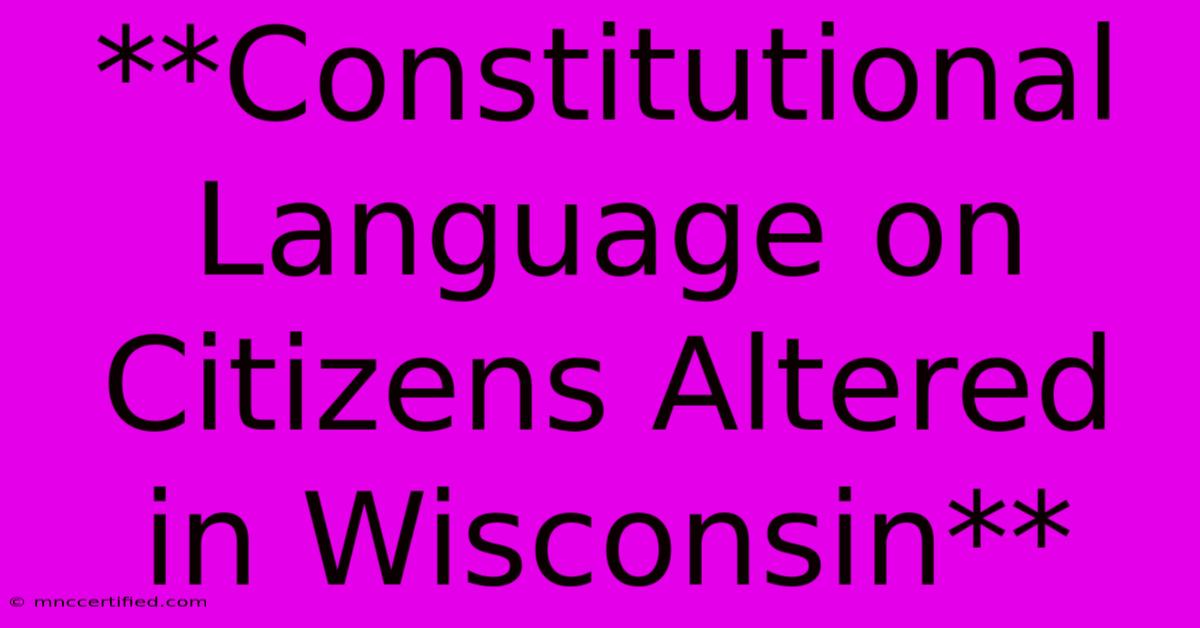**Constitutional Language On Citizens Altered In Wisconsin**

Table of Contents
Wisconsin's Changing Landscape: A Look at the Constitution and Citizen Rights
The Wisconsin Constitution, a cornerstone of the state's governance, has undergone transformations throughout its history. One of the most recent and significant changes involves the definition of "citizen" within its text. This article delves into the specifics of this alteration, exploring its implications and sparking discussion about the ongoing evolution of constitutional language in the face of contemporary societal challenges.
From "White Male" to "All Persons": A Historical Shift
The original Wisconsin Constitution, adopted in 1848, contained a restrictive definition of citizenship. It explicitly stated that only "white male citizens" could vote and hold office. This exclusionary language reflected the discriminatory practices prevalent at the time, denying suffrage and political participation to women, people of color, and other marginalized groups.
However, over time, the constitution evolved to reflect changing societal norms and values. The Fourteenth Amendment to the U.S. Constitution, ratified in 1868, guaranteed equal protection under the law for all citizens, regardless of race. This national shift spurred a wave of reform in Wisconsin, leading to the eventual removal of the "white male" clause from the state constitution in 1912.
The Modern Debate: "Person" vs. "Citizen"
While the "white male" clause was removed over a century ago, the debate regarding the definition of "citizen" within the Wisconsin Constitution continues. In recent years, there has been a growing movement to replace the term "citizen" with "person" in various sections of the document. This shift aims to ensure that all individuals, regardless of their citizenship status, are afforded equal protection under the law.
Proponents of this change argue that the use of "citizen" inadvertently creates a hierarchy, potentially leading to the exclusion of non-citizens from certain rights and protections. They point to areas such as access to education, healthcare, and legal representation as examples where the distinction between "citizen" and "person" could have tangible consequences.
Opponents of this change contend that using the term "person" could potentially weaken the rights of U.S. citizens and dilute the meaning of citizenship. They express concerns about the impact on voting rights, eligibility for public office, and the ability to participate in certain aspects of the political process.
Exploring the Implications
The debate over the definition of "citizen" in the Wisconsin Constitution raises critical questions about the nature of citizenship, the scope of individual rights, and the role of government in protecting those rights.
Here are some key areas to consider:
- Equal Protection Under the Law: To what extent should the constitution guarantee equal protection for all persons, regardless of citizenship status?
- The Right to Vote: How does the definition of "citizen" impact voting rights and the ability to participate in the democratic process?
- Access to Public Services: Should non-citizens have equal access to public services such as education, healthcare, and social safety nets?
- The Meaning of Citizenship: What are the fundamental rights and responsibilities associated with U.S. citizenship?
Moving Forward: A Need for Dialogue and Action
The ongoing debate surrounding the definition of "citizen" in the Wisconsin Constitution highlights the dynamic nature of constitutional language and its evolving relationship with societal values. Engaging in open and informed discussion is crucial to navigating this complex issue and finding solutions that reflect the principles of fairness, justice, and equal protection for all.
This article is intended to spark conversation and provide a platform for exploring the different perspectives surrounding this important issue. As citizens of Wisconsin, we have a collective responsibility to understand these complex matters and engage in meaningful dialogue that leads to a more just and equitable society.

Thank you for visiting our website wich cover about **Constitutional Language On Citizens Altered In Wisconsin**. We hope the information provided has been useful to you. Feel free to contact us if you have any questions or need further assistance. See you next time and dont miss to bookmark.
Featured Posts
-
Trump On Space X Starlink Starship Plans
Nov 07, 2024
-
United Equitable Insurance Company Reviews
Nov 07, 2024
-
Can You Get Hurricane Insurance In Florida
Nov 07, 2024
-
The View Hosts Express Dismay At Trump Win
Nov 07, 2024
-
Wisconsin Voters Approve Voting Referendum
Nov 07, 2024